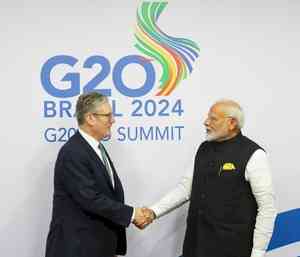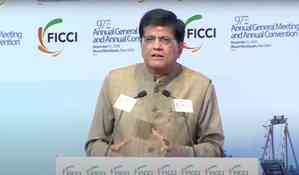Will Sunak's Conservatives buck UK poll predictions or Starmer's Labour reprise 1997 landslide?
Will UK Prime Minister Rishi Sunak succeed in retaining power in an election under his leadership, or will his Labour opponent, Sir Keir Starmer, pull off a landslide, reminiscent of 1997 when Tony Blair dislodged the Conservatives who had won the previous five elections since 1979?

Vikas Datta
New Delhi, July 3 (IANS) Will UK Prime Minister Rishi Sunak succeed in retaining power in an election under his leadership, or will his Labour opponent, Sir Keir Starmer, pull off a landslide, reminiscent of 1997 when Tony Blair dislodged the Conservatives who had won the previous five elections since 1979?
And what will be the way ahead for the UK, battered by severe domestic challenges for over a decade now, let alone the volatile global environment?
People will head out to vote for a new government on Thursday, in what will be an acid test for both Prime Minister Sunak and Starmer in their first electoral contest as leaders, amid significant public disenchantment over the state of the economy, dipping standards of living, and governance issues.
While the results of the recent regional polls and pre-poll surveys indicate a landslide Labour victory, the party itself has warned members and supporters of complacency and urged them to continue their efforts. On the other hand, the Conservatives, under Sunak - the party's third Prime Minister since the 2019 polls - are still hawkish as they engage in a last-ditch effort.
Surveys paint an advantage for Labour. As per a BBC poll tracker, as of July 1, based on 20 polls conducted by members of the British Polling Council, Labour is predicted to gain an average of 40 per cent votes (35 to 45 per cent), down from a high of 45 per cent as of June 1. On the other hand, the Conservatives are estimated to get 20 per cent (15 to 25 per cent), down from 24 per cent on June 1.
Similar to the right-wing wave sweeping Europe, as seen in the victory of Marine Le-Pen's National Rally in both the European Parliament and the first round of the French National Assembly elections, the gains by Alternative for Democracy (AfD) in Germany, and the performance of Geert Wilders' PVV in the recent elections in the Netherlands, the Reform UK, which had championed Brexit, is in third position.
The Nigel Farage-led party is expected to garner 16 per cent votes (13 to 19 per cent) - not far behind the Conservatives, even as two of its candidates switched over to the Conservatives over "rampant racism" in the party, while three were dropped due to their "offensive comments," including against Sunak - the first non-white PM of the UK.
In fourth place, are the Liberal Democrats, with 11 per cent (8 to 14 per cent), even as they seek to retain their number three position. Party chief Sir Ed Davey, on Tuesday, indulged in his first bungee jump as he asked voters to take the plunge and support his party while asserting its mission of uprooting the Conservatives. The party, which helped the Conservatives come to power in 2010 by entering into a coalition with it, has ruled out any such eventuality now. However, it is open to tying with Labour.
The Greens follow with 6 per cent of the vote (3 to 9 per cent), followed by regional parties, Scottish National Party (Scotland) with 3 per cent (2 to 4 per cent) and Plaid Cymru (Wales) with 1 per cent.
The final days of the contest have both principal parties in full attack mode. PM Sunak is extolling his own record in his small stint in power and warning against the "dangers" of a Labour government and the implications of its proposed tax policies. On the other hand, Starmer, with the party slogan of "Change. Be a part of it," stresses the need to remove the present dispensation while clarifying the party position on sensitive issues like taxation, immigration, and prison reforms.
However, a lot of voters still remain alienated.
While there are many who blame the Conservatives, in power since 2010, for most of the present economic and social malaises - especially the long waiting lists for National Health Service (NHS), deprecate as the Brexit episode, the shenanigans - and attempted coverups - of Prime Minister Boris Johnson during Covid lockdown, and the rapid leadership turnover, Labour is not an automatic alternative.
The party, deemed even a lot less radical now than under Jeremy Corbyn, after Starmer took over in 2020 and, as per his own admission, "reformed" it, also has to address the trust deficit.
Some voters, including those of South Asian origin, admit that they see no difference between both parties in addressing their concerns and problems, despite all the rhetoric and promises on the campaign stump and the manifestos.
No matter who wins, the task of surmounting the legacy social and economic issues, the tendency of distrust in major parties, the growing rise of far-right populists - as la Europe - and finally, finding the post-EU UK's place in the world will be major and enduring challenges.
(Vikas Datta can be contacted at [email protected])
--IANS
vd/kvd


 IANS
IANS 













